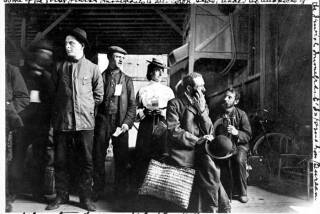EXCERPT FROM âSHIP OF GOLDâ
ABOARD THE CENTRAL AMERICA, NEAR DARK, SATURDAY, SEPTEMBER 12, 1857:
Captain Herndon talked in private with Thomas Badger, and the two men agreed again that the ship must go down. Herndon repeated that he would not leave his ship while there was a soul on board. . . .
Many of the men continued bailing, but the lines had dwindled now that the women and children had all been carried safely to the Marine. The men could hear the water still rising in the hold. As darkness approached, they could feel the ship slipping away beneath them, and they abandoned the bailing lines to search for life preservers and pieces of the ship to keep them afloat. . . .
Weak from lack of food and sleep, exhausted from their labors, and discouraged by the losing hand fate was dealing, some of the men made no effort to secure a life preserver or a board, instead returning to their cabins or crawling into someone elseâs to await fateâs final card.
One forty-niner was returning home penniless to a wife who had gone insane since he had left her eight years earlier. As the sky grew darker and the ship settled deeper into the sea, the manâs bunkmate stood in steerage pleading with him to try to save himself. âWhen the critical moment arrived,â said the bunkmate, âhe refused to make any effort to escape.â
In the same part of the ship with the poet Oliver Manlove were two brothers named Horn who had gone to California in 1850. Working together and working hard they had unearthed six thousand dollarsâ worth of gold, which they had kept in a large carpet sack that one or the other had guarded throughout the trip.
âI found Anson Horn weeping,â wrote Manlove. âHe said that his time had come, that he should never see his home again, which he had longed to see, praying and hoping for it. I tried to encourage him but he fully believed that his fate was sealed, that all of our fates were sealed, and that there was no use in fighting against it.â
The thought that had intruded many times into the fear and exhaustion of the past two days came sharply into focus during those latter moments, for now they had to decide whether to take the gold or leave behind. Most of the passengers were returning miners who had accumulated at least a few thousand dollars in gold, which they carried with them in treasure belts, carpetbags, and purses. But gold was dense. A red house brick weighed about four pounds; a gold brick of the same size weighed nearly fifty. Even in smaller amounts, gold could sink a weak swimmer or quickly exhaust a strong one. Yet some of the men had suffered great hardship since the summer of 1849 to accumulate the contents of that treasure belt or that carpetbag.
As if to dramatize the hysteria of such a dilemma, one man ripped open a bag containing twenty thousand dollars in gold dust and sprayed it about the main cabin as though he were a pixie and the gold were nothing more than tiny grains of sand. Others unhitched treasure belts, upended purses, and snapped open carpetbags, flinging the shiny coins and dust across the floor. âHundreds of thousands of dollars were thus thrown away,â said a passenger. . . .
Three or four hundred men waited on deck, while others remained in the cabins and corridors below. Darkness had closed in, and the Central America had settled so low in the water that now almost every wave broke over her. Bubbles, millions of them racing across the ship, formed and popped so fast as to make a hissing sound, and rising from below came the sound of timbers cracking and splintering.
More to Read
Sign up for Essential California
The most important California stories and recommendations in your inbox every morning.
You may occasionally receive promotional content from the Los Angeles Times.










